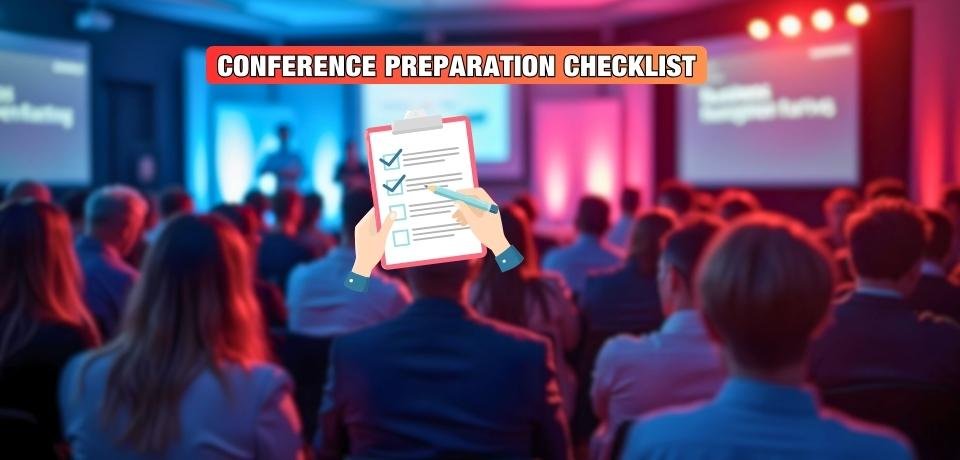A successful conference requires proper planning. As an organizer, ensuring every detail is covered can make the difference between a smooth event and one filled with challenges. A well-prepared conference provides a positive experience for both attendees and organizers, helping to meet objectives and create lasting impressions.
A comprehensive conference preparation checklist helps you stay on track and manage every aspect of the event. From defining clear objectives and selecting the right venue to managing registration, transportation, and integrating technology, this checklist covers it all.
It ensures effective coordination across your team and enhances the delegate experience. Continue reading to discover how to use this checklist to create a flawless conference!
Why is Proper Conference Preparation Important for Success?
Every detail, from scheduling to logistics, plays a crucial role in the conference’s success. Here are some reasons why organizers should pay attention to proper preparation to have a successful conference.

Ensuring Smooth Event Flow
A well-prepared conference ensures that every aspect flows without disruption, from check-ins to closing sessions. Organizers who prepare properly can avoid unexpected delays or technical issues. When these details are handled in advance, it reduces stress on the day of the event. Additionally, it allows for better management of large-scale events like an international business conference, ensuring everything stays on track.
Maximizing Attendee Engagement
Organizers who prepare effectively can create an engaging atmosphere that keeps attendees focused and interested. Proper planning allows for well-structured sessions, minimizing downtime and maximizing interaction. This engagement builds stronger connections between attendees and speakers. Attendees are more likely to return when they feel their time was used productively.
Handling Last-Minute Changes
Proper preparation includes planning for potential last-minute changes or challenges that may arise. Whether it’s a speaker cancellation or a technical issue, being prepared makes handling problems easier. Backup plans for these situations ensure the conference can continue smoothly. Attendees appreciate the effort, and organizers avoid chaos.
Enhancing the Event Experience
When every detail is planned, organizers create a positive and memorable experience for everyone involved. From food arrangements to seating, well-prepared conferences ensure attendees feel comfortable and welcomed. Good preparation can even boost an event’s reputation, attracting future participants. A positive experience guarantees strong feedback and word-of-mouth promotion.
What Should Be Included in a Conference Preparation Checklist?
Conference preparation involves multiple steps to ensure a successful and smooth event. Organizers need to cover every detail to create a seamless experience for attendees. Let’s explore what should be included in a comprehensive conference preparation checklist.

Establish Clear Objectives
Defining clear objectives is the foundation of effective conference planning. It helps organizers focus on the event’s purpose and desired outcomes. Without clear goals, it’s challenging to make decisions that align with the overall vision.
Setting objectives guides every aspect of the conference, from selecting topics to choosing speakers. It ensures that each element contributes to the event’s success. Clear objectives also make it easier to measure results after the conference concludes.
Moreover, well-defined goals communicate the conference’s value to potential attendees. When people understand what they can gain, they’re more likely to participate. This clarity boosts registration numbers and enhances attendee satisfaction.
Choose the Right Venue
Selecting an appropriate venue is crucial for creating the right atmosphere. The venue sets the tone and accommodates all logistical needs. It’s important to consider factors like capacity, location, and available amenities.
A suitable venue ensures attendees are comfortable throughout the event. Adequate space allows for smooth movement and networking opportunities. Additionally, facilities like Wi-Fi and audio-visual equipment support presentations and workshops.
Location plays a significant role in accessibility. A venue that’s easy to reach encourages higher attendance. Proximity to hotels and public transportation adds convenience for out-of-town guests.
Plan Accommodations and Transportation
Organizers need to consider where attendees will stay and how they’ll get around. Coordinating accommodations ensures guests have comfortable lodging options. Partnering with local hotels can provide discounted rates and block bookings.
Transportation planning includes arranging shuttles or providing information about transit options. Clear directions and maps help attendees explore the area. This attention to detail reduces stress and enhances the overall experience.
Considering accessibility needs is also important. Providing solutions for attendees with disabilities ensures inclusivity. Thoughtful planning in this area reflects positively on the conference and its organizers.
Tackle Event Registration and Ticketing
A smooth registration process is vital for a positive first impression. Utilizing user-friendly platforms makes it easy for attendees to sign up. Clear instructions and multiple payment options enhance the experience.
Efficient ticketing systems prevent long lines and confusion on the event day. Digital tickets or badges streamline check-in procedures. Organizers can also collect valuable data during registration to personalize the event.
Offering early-bird discounts or group rates can boost registration numbers. These incentives encourage prompt sign-ups and help with budgeting. Clear communication about deadlines and pricing avoid misunderstandings.
Settle on a Theme
Choosing an engaging theme ties the conference together. It provides a cohesive framework for content, marketing, and decor. A well-defined theme captures interest and sets the event apart.
The theme should resonate with the target audience and industry trends. It guides the selection of speakers and session topics. A compelling theme also makes promotional efforts more effective.
Consistency in theme execution enhances the attendee experience. From invitations to signage, a unified theme creates a memorable event. It reinforces the conference’s objectives and leaves a lasting impression.
Design the Delegate Journey
Mapping out the delegate journey ensures attendees have a smooth experience. This involves planning every touchpoint from arrival to departure. Anticipating needs and questions helps prevent issues.
Creating detailed schedules and providing them in advance keeps attendees informed. Including session descriptions and speaker bios adds value. Organizers can also plan networking opportunities to create connections.
Feedback mechanisms allow attendees to share their experiences. This input helps improve future events. A well-designed journey makes participants feel valued and engaged.
Identify Your Team and Set Roles
A dedicated team is essential for executing a successful conference. Clearly defined roles prevent overlap and confusion. Assigning responsibilities ensures all tasks are covered efficiently.
Effective communication within the team is crucial. Regular meetings and updates keep everyone aligned. Collaboration tools can aid in coordinating efforts and sharing information.
Providing training and resources empowers team members. When everyone understands their role, the event runs smoothly. A strong team reflects positively on the conference as a whole.
Select the Right Conference Technology
Integrating the right technology enhances the event experience. Tools like conference apps facilitate engagement and information sharing. Live streaming options can expand the audience beyond physical attendees.
Choosing reliable technology reduces the risk of technical issues. Testing equipment beforehand ensures everything works as intended. Technical support should be available throughout the event.
Technology can also aid in data collection and analysis. Tracking attendance and session popularity provides insights. These metrics help in evaluating the conference’s success and planning future events.
A thorough conference preparation checklist covers all essential aspects of event planning. By addressing each element with care, organizers can create a successful and memorable conference. Proper preparation leads to a positive experience for both attendees and organizers alike.
Factors to Keep in Mind While Setting a Conference Objective
Setting clear objectives is essential for organizing a successful conference. Well-defined goals guide every decision, from session topics to marketing strategies. Here are key factors to consider while setting your conference objectives.
- Consider the audience’s needs to ensure the objectives align with their interests. Personalized content enhances engagement and drives higher attendance.
- The industry trends should guide the objectives to keep the conference relevant. Aligning with trends creates more buzz and attracts attention.
- Define measurable goals to track the conference’s success accurately. Tracking metrics helps in evaluating both short- and long-term impact.
- Financial goals are equally important for planning a sustainable event. Revenue targets guide decisions on ticket prices, sponsorships, and expenses.
- The conference’s theme should naturally fit the set objectives. A cohesive connection between them creates a more focused and impactful event.
- Involving key stakeholders ensures that the objectives reflect the broader vision. Collaborating early prevents misalignment and encourages support.
- Objectives should also include ways to create networking opportunities. Encouraging interaction among attendees enriches the overall conference experience.
- Prepare a timeline that aligns with the goals and allows for necessary adjustments. Flexibility in the timeline can prevent last-minute issues.
A clear and focused objective leads to a more successful conference. Keeping these factors in mind will ensure your event has a solid foundation for success. While setting objectives, don’t forget to explore ways to prepare for a conference effectively. Addressing preparation ensures the goals translate smoothly into action on the day of the event.
How to Prepare the Essential Materials for the Conference?
As an organizer, preparing essential materials is a significant step to ensure your conference runs smoothly. From registration documents to presentation slides, every detail matters in creating a professional experience for attendees. Here is a step-by-step guide to help you prepare the needed materials:

Step 1: Gather Speaker Presentations Early
Request all presentations from speakers well in advance of the conference. This gives you ample time to review and ensure everything meets your technical standards. Doing this prevents last-minute scrambling or unexpected format issues. Make sure to offer speakers guidance on formatting and timing to maintain consistency.
Step 2: Prepare Registration and Name Badges
Ensure all registration materials are ready before the event. Create printed or digital badges with attendee names, titles, and affiliations. Double-check the accuracy of these details to avoid errors on the day. Efficiently organizing registration materials ensures a smoother check-in process for attendees.
Step 3: Organize Handouts and Conference Programs
Print or prepare digital versions of the conference program, agenda, and speaker bios. These materials guide attendees through sessions and workshops. Make sure the handouts are easy to read and visually appealing. You can also provide QR codes for digital access, reducing paper use.
Step 4: Test Audio-Visual Equipment
Check all audio-visual materials, including projectors, microphones, and laptops, to ensure smooth presentations. Conducting a thorough equipment test can prevent technical glitches during the event. Have backups in place, like extra cables or batteries. This preparation minimizes potential disruptions and keeps the event running on time.
Step 5: Prepare Sponsor Materials and Branding
Ensure that all sponsor materials, banners, and displays are ready and match your event branding. Place sponsor logos strategically throughout the venue, and in presentations or programs. A cohesive branding experience helps build stronger connections with sponsors. Make sure all sponsor commitments are fully met, leaving them satisfied with their investment.
Methods You Can Apply to Get Good Sponsors for the Conference
Securing good sponsors for a conference can significantly impact its success. Sponsors help cover costs and enhance the event’s reputation. Here are effective methods to attract the right sponsors for your next conference.
Identify Sponsors Aligned With Your Event
Look for companies that align with your conference’s theme or industry. A strong match ensures mutual benefits for both parties. Reaching out to relevant sponsors increases the chances of interest. This approach creates a more authentic partnership.
Create an Attractive Sponsorship Package
Offer a detailed and appealing sponsorship package highlighting the benefits of partnering with your conference. Include visibility opportunities, branding, and audience reach. A well-organized package helps potential sponsors see value. Make sure to adjust it based on each sponsor’s goals.
Make Use of Existing Networks
Use your current network to find potential sponsors. Industry connections can help you reach companies interested in sponsoring similar events. A warm introduction is often more effective than a cold outreach. Building relationships beforehand improves your chances of securing a sponsor.
Highlight Audience Demographics
Sponsors care about who will be attending the event. Providing details on audience demographics, such as industry, position, and interests, adds value. Tailoring your pitch based on the attendees shows sponsors the potential for brand exposure. This helps them see the alignment between their target market and your event.
Engage Sponsors Early in the Planning
The earlier you engage sponsors, the better your chances of securing long-term partnerships. Early engagement gives sponsors more time to plan their involvement. It also allows you to offer them prime branding spots before other sponsors. Early discussions foster stronger collaborations.
What to Look for in a Keynote Speaker While Hiring?
Hiring the right keynote speaker is crucial for setting the tone of your conference. A great speaker can captivate the audience, convey important messages, and elevate the event’s reputation. Here’s what you should look for when hiring a keynote speaker.

Relevant Industry Experience
The speaker’s experience in the industry should align with the conference theme. A speaker with relevant expertise provides valuable insights to the audience. This connection ensures the message resonates with attendees. Industry experience builds credibility and trust among participants.
Strong Communication Skills
Effective communication is key to keeping the audience engaged throughout the session. A great speaker can convey complex ideas clearly and confidently. Engaging delivery captivates the audience’s attention from start to finish. Strong communication skills also allow the speaker to connect with diverse attendees.
Proven Track Record
A proven history of successful presentations is an important factor to consider. Look for speakers with positive feedback from past events. Testimonials or videos of their past speeches can provide insights into their performance. A solid track record reduces the risk of choosing an unqualified speaker.
Ability to Adjust Content
Keynote speakers should be able to customize their presentations to suit your event’s goals. Flexibility in adapting their message makes their speech more impactful. This tailoring ensures the content aligns with the audience’s expectations. Customizing presentations enhances the relevance of their speech.
Engaging Storytelling Skills
A strong keynote speaker knows how to tell compelling stories that inspire and motivate. Storytelling can turn abstract concepts into relatable lessons. Personal stories create an emotional connection with the audience. These memorable narratives leave a lasting impression on attendees.
How Do You Advertise for the Conference?
Promoting your conference effectively is essential to attract the right audience and ensure its success. By using a combination of marketing strategies, you can reach a wider audience and create excitement around the event. Here’s a step-by-step guide on how to advertise your conference.
Step 1: Utilize Social Media Platforms
Use social media channels to create buzz and generate interest for your conference. Share engaging content such as speaker announcements, event details, and behind-the-scenes updates. Regularly post event reminders to keep the momentum going. Encourage attendees to share and spread the word within their own networks.
Step 2: Create an Email Marketing Campaign
Send targeted email campaigns to your existing contacts and potential attendees. Highlight key aspects of the conference, like speakers, workshops, and special offers. Personalize your emails to create a more engaging experience. Regular follow-ups can enhance registration numbers as the event date approaches.
Step 3: Collaborate With Industry Influencers
Partnering with industry influencers helps expand your reach to a relevant audience. Influencers can promote your conference through their platforms, attracting their followers. Their endorsement can build credibility and generate excitement. Providing them with exclusive content will make the collaboration more valuable.
Step 4: Optimize Your Conference Website
Ensure your conference website is optimized for search engines and user experience. Provide clear information about the event, including schedule, speakers, and registration links. Make the site visually appealing and mobile-friendly. Adding testimonials from previous events can also boost credibility and encourage sign-ups.
Step 5: Use Paid Advertising
Invest in paid ads to reach a broader audience beyond your current network. Platforms like Google Ads and social media advertising offer targeted options. You can tailor ads to specific demographics or interests related to the conference. Tracking your ad performance helps you adjust and optimize for better results.
Mistakes You Should While Preparing a Conference
Preparing for a conference is a complex process that requires careful attention to detail. However, certain mistakes can derail even the most well-planned events. Here are key mistakes to avoid when organizing a conference:
- Neglecting early preparation leads to rushed decisions and overlooked details. Starting planning too late can cause unnecessary stress and last-minute issues.
- Failing to set clear objectives leaves the event without a focused direction. Attendees may feel disconnected if the content lacks cohesion.
- Overbooking sessions can overwhelm attendees and lead to lower engagement. A balanced schedule ensures participants can absorb the information effectively.
- Ignoring technical needs can result in disruptions during presentations. Always test audio-visual equipment and have backup options in place.
- Overlooking attendee feedback from previous events limits opportunities for improvement. Gathering insights helps you fine-tune the event and meet expectations.
- Skipping rehearsal with keynote speakers can cause coordination issues on the day. A dry run ensures everyone is aligned and ready.
Post Conference Checklist- What Should You Do As an Organizer?
After the conference ends, the work of an organizer isn’t quite finished. Post-conference tasks are crucial to wrap up the event and assess its success. Here’s a checklist of actions you should take as an organizer to ensure everything is completed effectively.

Follow Up With Attendees
Send thank-you emails to all attendees, speakers, and sponsors. Acknowledge their participation and highlight key takeaways from the event. Including a post-event survey can help gather valuable feedback. This step builds lasting relationships and sets the stage for future collaborations.
Review Feedback and Data
Collect and analyze feedback from attendees, speakers, and your team. Focus on key insights that can improve future events. Review registration data, session attendance, and engagement metrics. Understanding what worked and what didn’t informs better planning and strategy next time.
Conduct a Team Debrief
Hold a debrief session with your organizing team to review the event’s performance. Discuss what went well and identify areas for improvement. Use the feedback to refine processes for future conferences. This internal review keeps your team aligned and ready for upcoming events.
Reconcile Finances and Settle Payments
Ensure all payments to vendors, speakers, and service providers are finalized. Reviewing the budget helps track any discrepancies or unanticipated costs. It’s also an opportunity to evaluate whether financial goals were met. Keeping accurate records ensures a smooth financial closeout.
Archive Event Materials and Content
Store all conference materials, including presentations, videos, and attendee lists, for future reference. You may also want to repurpose content for future marketing efforts. Make sure to share any key materials with attendees or those who missed sessions. Organizing materials ensures easy access to upcoming events.
A comprehensive post-conference checklist ensures no detail is overlooked after the event concludes. By following up with attendees, reviewing feedback, and reconciling finances, you can ensure long-term success. These key considerations when preparing for a conference also help inform your approach to post-event tasks, keeping everything on track.
Frequently Asked Questions about Conference Preparation Checklist
Preparing for a conference involves multiple steps to ensure a smooth and successful event. Addressing common questions about the process can help both organizers and attendees stay organized. Here are a few frequently asked questions related to a conference preparation checklist.
What Are the First Steps in Conference Planning?
The first steps in planning include setting clear objectives, selecting a theme, and choosing a venue. These foundational tasks help guide the rest of the planning process and ensure everything aligns with the event’s goals and target audience.
How Far in Advance Should Conference Planning Begin?
It’s recommended to start planning at least six months to a year in advance. Early preparation allows time to secure venues, arrange speakers, and coordinate logistics. This also ensures the conference has enough promotion to attract attendees.
What Should Be Included in Conference Marketing?
Conference marketing should include social media promotion, email campaigns, and partnerships with industry influencers. A dedicated website with event details also helps boost registrations. Effective marketing strategies attract the right audience and create excitement for the event.
How Do You Ensure Attendee Engagement During the Conference?
Providing engaging sessions, networking opportunities, and interactive workshops helps maintain attendee interest. Engaging speakers and diverse session formats are crucial. Encouraging attendees to participate in discussions or activities also fosters a more involved and rewarding experience.
How Do You Select the Right Speakers for a Conference?
Choose speakers based on their expertise, industry relevance, and ability to engage the audience. Evaluating their past presentations helps ensure they can deliver valuable insights. It’s also important to match their expertise with the conference’s theme and audience expectations.
What Tools Should Be Used for Conference Registration?
Utilize reliable event management platforms like Eventbrite or Cvent for seamless registration processes. These platforms offer online ticketing, attendee tracking, and payment options. They make it easier to manage registrations, collect data, and provide attendees with a hassle-free experience.
How Can You Measure the Success of a Conference?
Success can be measured through attendee feedback, registration numbers, and engagement levels during sessions. Post-conference surveys and data analysis provide insights into what worked and what didn’t. This feedback helps refine future conference strategies and improve attendee satisfaction.
Bottom Lines
A successful conference depends on proper planning and attention to all the essential details. By using a conference preparation checklist, you can stay organized and avoid missing important tasks along the way. This checklist helps in setting clear goals, arranging logistics, and preparing materials.
Each step ensures a smooth event that offers a valuable experience to all attendees. From choosing a venue to engaging your audience, thorough preparation makes a big difference. Whether you’re hosting a small or large event, following the right steps leads to better outcomes. A well-prepared conference leaves a lasting positive impression.